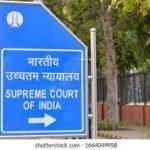The appellant challenged a judgment and order from the High Court of Andhra Pradesh that dismissed his writ petition for habeas corpus. The habeas corpus petition sought to declare the arrest and continued detention of his son, Kessireddy Raja Shekhar Reddy, as illegal and unlawful [1, 3f].
The appellant’s son was arrested on 21 April 2025 in connection with Crime No. 21 of 2024, registered on 23 September 2024, by CID Police Station, Mangalagiri. The offences included Sections 420 (cheating), 409 (criminal breach of trust), and 120-B (criminal conspiracy) of the Indian Penal Code (IPC), now Sections 318, 316(5) of the Bharatiya Nyaya Sanhita, 2023 (“BNSS”). The son was arrayed as Accused No. 1 on 19 April 2025 via an entry in the case diary [2, 5b]. He was arrested at Hyderabad Airport at approximately 6 P.M. [2c, 5a]. The grounds for arrest were supplied to him and subsequently to the appellant [2c, 10.2]. He was produced before the Special Judge for SPE and ACB cases, Vijayawada, at 5:15 P.M. on 22 April 2025, within 24 hours of arrest [2d, 11.1]. Police remand was requested and granted on 22 April 2025 [3d, 3e].
Law Involved : The judgment involved the interpretation and application of:
- Article 21 of the Constitution of India: Protection of life and personal liberty [3f, 13.9].
- Article 22 of the Constitution of India: Protection against arrest and detention in certain cases, specifically requiring communication of grounds of arrest “as soon as may be,” production before a magistrate within 24 hours, and the right to consult a legal practitioner [3f, 7aii, 13.10, 21.14, 22.15, 23.19, 24.a, 24.b, 26.c, 26.d, 27.g, 27.h, 28.22, 28.23, 29.25, 30.28].
- Bharatiya Nyaya Sanhita, 2023 (BNSS):
Section 35 (formerly Section 41 CrPC): Conditions under which police may arrest without a warrant [14.11, 15.11, 16.11].
Section 47 (formerly Section 50 CrPC): Obligation of police officer to inform grounds of arrest and right to bail [4i, 7aii, 8iii, 17.12, 23.19, 23.20, 24.e].
Section 48 (formerly Section 50A CrPC): Obligation to inform a relative or friend of the arrested person [4i, 17.13, 25.3].
Section 179 (formerly Section 41A CrPC): Notices for appearance before police [5a].
- Prevention of Corruption Act, 1988 (PC Act): Specifically, Section 17A, requiring prior approval for inquiry or investigation against a public servant [8iv, 9.4].
- Precedents cited and discussed:
Vihaan Kumar v. State of Haryana [4k, 10.2, 20.15, 26.18, 27.19, 33.37].
Pankaj Bansal v. Union of India [21.14, 22.15, 25.2].
State of Bombay v. Atma Ram [28.22].
Magan Lal Jivabhai, In Re [28.23].
Christie v. Leachinsky (English law) [30.29, 31.31].
McNabb v. United States of America (US law) [32.33].
Vimal Kishore Mehrotra v. State of Uttar Pradesh [33.36].
Reasoning :The Supreme Court considered the arguments from both sides and the High Court’s findings.
- Appellant’s Contentions: The appellant argued that the arrest was per se illegal and the detention unlawful, violating Article 21 of the Constitution [3f]. He contended that the grounds of arrest, although supplied, were not “meaningful” or lacked “material particulars” [3g, 7aii, 27.19]. It was also argued that the son was not initially an accused in the FIR, but rather arrayed via a case diary entry [5b]. Furthermore, the appellant alleged mala fide intent behind the arrest, suggesting it was to implicate the former Chief Minister [6b]. A significant point of contention was that the Prevention of Corruption Act provisions were invoked without prior sanction under Section 17A of the PC Act [8iv, 9.4].
- State’s Contentions: The State maintained that the son was indeed arrayed as Accused A1 via a case diary entry on 19 April 2025 [10.1]. They asserted that the grounds of arrest were supplied to both the son and the appellant, and that there was compliance with Article 22 of the Constitution and relevant BNSS provisions [10.2, 11.4]. The State affirmed that the son was produced before the Magistrate within 24 hours as required [10.3, 11.3]. Crucially, the State claimed that approval for the addition of PC Act sections was obtained on 21 April 2025 itself [12.8].
- Supreme Court’s Analysis (Implicit leading to dismissal): While the judgment does not explicitly detail the Supreme Court’s step-by-step reasoning for dismissing the appeal, its final decision implies that it found the requirements for a lawful arrest and detention, as per the relevant constitutional and statutory provisions, to have been met. The Court likely found:
That the communication of grounds of arrest, though challenged by the appellant, was deemed sufficient and meaningful, as per the High Court’s finding [4i] and consistent with the State’s submissions [10.2].
That the procedural requirements of producing the arrested person before a Magistrate within 24 hours were adhered to [2d, 11.3].
That the invocation of the Prevention of Corruption Act and the necessary approval under Section 17A were found to be in order, based on the State’s submission [12.8].
The Court likely agreed with the High Court that there was no “gross abuse of process of law” or violation of fundamental rights warranting habeas corpus relief [4i]. The Court concluded that “In view of the aforesaid, we do not find any merit in this appeal” [34.38].
Holding: The Supreme Court dismissed the appeal, thereby upholding the judgment and order of the High Court of Andhra Pradesh [34.38]. This means the arrest and subsequent detention of Kessireddy Raja Shekhar Reddy were deemed lawful by the Supreme Court, and the habeas corpus petition was effectively rejected. The Court clarified that the arrested person is at liberty to apply for regular bail before the competent court [34.39].
Kasireddy Upender Reddy V. State Of Andhra Pradesh And Others
Supreme Court: 2025 INSC 768: (DoJ 23-05-2025)






